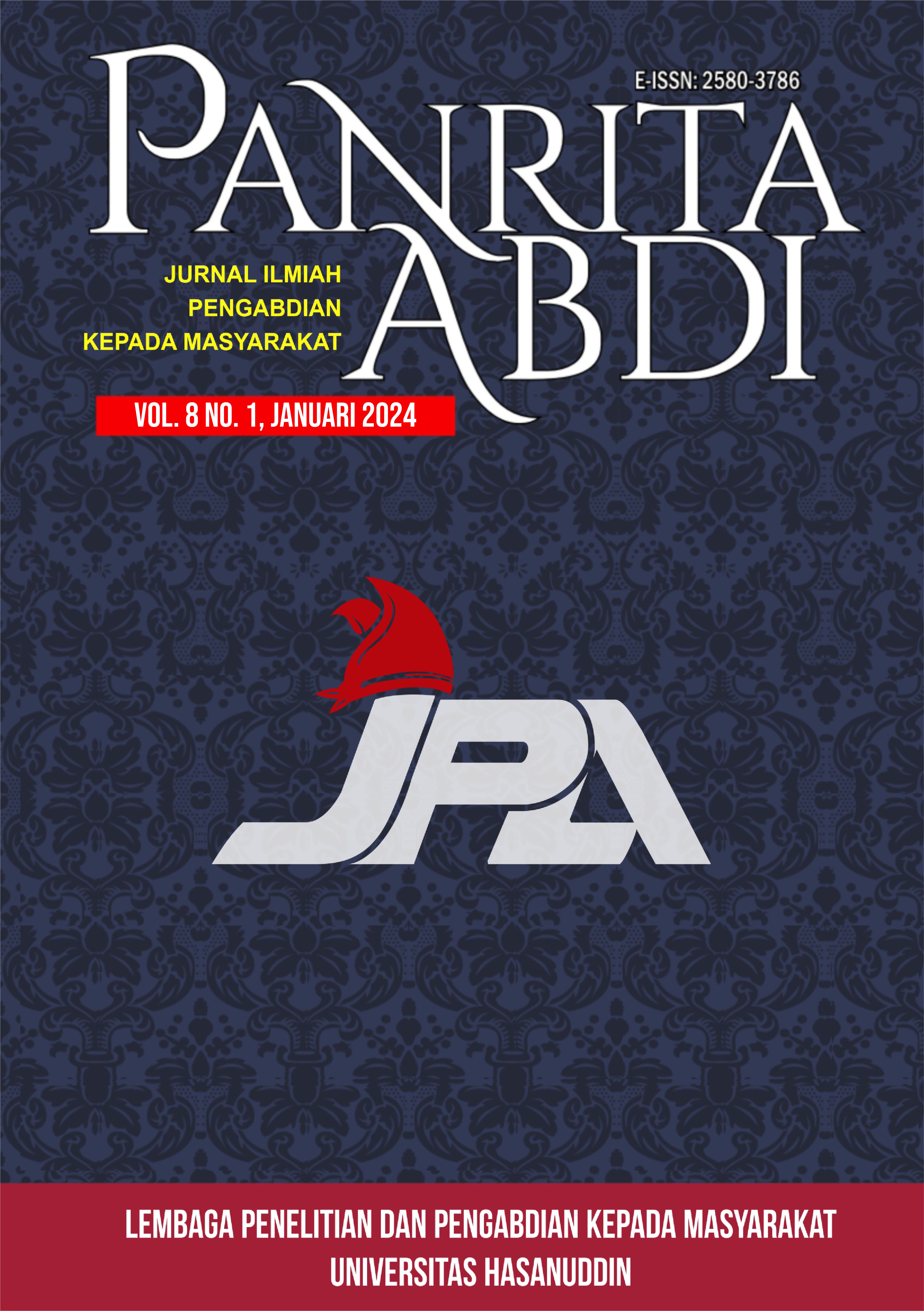PELATIHAN MANAJEMEN KONTEN PEMBELAJARAN BERBASIS MOODLE SEBAGAI SISTEM PENGAWASAN KETUNTASAN BELAJAR PADA SMK NEGERI JATENG DI SEMARANG
DOI:
https://doi.org/10.20956/pa.v8i1.22634Keywords:
Moodle, content management, learning management systemAbstract
The development of learning technology is growing rapidly in line with restrictions on human movement due to the COVID-19 pandemic. The Moodle-based Learning Management System (LMS) is a learning technology that can be used to access learning content in electronic form and can be accessed using student devices using the internet. The Moodle LMS can support teaching and learning activities (TLA) to continue amid the COVID-19 pandemic. Mastery of learning content management at LMS Moodle is essential for teachers to achieve learning objectives by utilizing various learning media and evaluation processes. This training aims to assist teachers at Central Java State Vocational Schools in Semarang in using the multiple features available in the Moodle LMS to support online teaching and learning as a complement to offline education. The training was divided into two stages by utilizing Zoom Meetings for as many as three meetings for the IT team and one LMS Moodle training offline, which the teacher attended. The training results from the questionnaire analysis showed that the participants were satisfied with the PkM implementation conducted by the PNM IT Team. In addition, participants can create various models of learning content and evaluation of learning by utilizing various features in the Moodle LMS. --- Perkembangan teknologi pembelajaran berkembang pesat seiring dengan pembatasan pergerakan manusia akibat pandemi covid-19. Learning Management System (LMS) berbasis Moodle merupakan salah satu teknologi pembelajaran yang dapat digunakan untuk mengakses konten pembelajaran dalam bentuk elektronik serta dapat diakses menggunakan gawai peserta didik dengan memanfaatkan internet. Pemanfaatan LMS Moodle dapat mendukung Kegiatan Belajar Mengajar (KBM) tetap terlaksana ditengah pandemi covid-19. Penguasaan manajemen konten pembelajaran pada LMS Moodle menjadi penting dikuasai guru sebagai salah satu upaya mencapai tujuan pembelajaran dengan memanfaatkan berbagai media pembelajaran dan proses evaluasi pembelajaran. Pelatihan ini bertujuan untuk membantu guru di SMK Negeri Jateng di Semarang dalam memanfaatkan berbagai fitur yang ada pada LMS Moodle untuk mendukung KBM secara daring ataupun sebagai pelengkap KBM secara luring. Pelatihan terbagi menjadi dua tahap dengan memanfaatkan Zoom Meeting sebanyak 3 kali pertemuan untuk tim IT dan satu kali pelatihan LMS Moodle scara luring yang dihadiri oleh guru. Hasil pelatihan dari analisa kuisoner, peserta menunjukkan kepuasan penyelenggaraan PkM yang dilakukan oleh Tim TI PNM. Selain itu peserta dapat membuat berbagai model konten pembelajaran dan evaluasi pembelajaran degan memanfaatkan berbagai fitur pada LMS Moodle.
References
Bradley, V. M. (2020). Learning Management System (LMS) Use with Online Instruction. International Journal of Technology in Education, 4(1), 68. doi: 10.46328/ijte.36
Keputusan Gubernur Jawa Tengah Nomor 420/28 Tahun 2014 Tentang Pendirian Sekolah Menengah Kejuruan Negeri Jawa Tengah, (2014).
Herliandry, L. D., Nurhasanah, Suban, M. E., & Kuswanto, H. (2020). Pembelajaran Pada Masa Pandemi Covid-19 (Lessons Learned During the Covid-19 Pandemic). Jurnal Teknologi Pendidikan, 22(1), 65–70.
Hodges, C., Moore, S., Lockee, B., Trust, T., & Bond, A. (2020). The Difference Between Emergency Remote Teaching and Online Learning.
LTMPT. (2021). Top 1000 Sekolah Tahun 2021 Berdasarkan Nilai UTBK. Lembaga Tes Masuk Perguruan Tinggi. Retrieved from https://top-1000-sekolah.ltmpt.ac.id/
Mustikaning Palupi, T., Tamela, E., & Diterima, N. (2022). Pelatihan Google Workspace for Education melalui Pembelajaran Berbasis Proyek bagi Guru SMP Google Workspace for Education Training for Junior High School Teachers using Project-based Learning (Vol. 6). Retrieved from http://journal.unhas.ac.id/index.php/panritaabdi
Ogedebe, P. M., & Jacob, B. P. (2012). ARPN Journal of Systems and Software Software Prototyping: A Strategy to Use When User Lacks Data Processing Experience. 2(6). Retrieved from http://www.scientific-journals.org
Saichaie, K. (2020). Blended, Flipped, and Hybrid Learning: Definitions, Developments, and Directions. New Directions for Teaching and Learning, 2020(164), 95–104. doi: https://doi.org/10.1002/tl.20428
Simanullang, N. H. S., & Rajagukguk, J. (2020). Learning Management System (LMS) Based On Moodle To Improve Students Learning Activity. Journal of Physics: Conference Series, 1462(1), 12067. doi: 10.1088/1742-6596/1462/1/012067
Syah, R. H. (2020). Dampak Covid-19 pada Pendidikan di Indonesia: Sekolah, Keterampilan, dan Proses Pembelajaran. SALAM: Jurnal Sosial Dan Budaya Syar-i, 7(5). doi: 10.15408/sjsbs.v7i5.15314
Tubagus, M., Muslim, S., & Suriani, S. (2020). Development of Learning Management System-Based Blended Learning Model using Claroline in Higher Education.
Wahyono, P., Husamah, H., & Budi, A. S. (2020). Guru profesional di masa pandemi COVID-19: Review implementasi, tantangan, dan solusi pembelajaran daring. Jurnal Pendidikan Profesi Guru, 1(1), 51–65.
Wahyuni, A., Bayti, C. S., Purnama, A. R., & Wahyundari, L. (2021). Dampak Implementasi Pembelajaran Daring Pada Masa Pandemi Covid-19. Biogenesis, 17(2), 88. doi: 10.31258/biogenesis.17.2.88-93
WHO. (2021). COVID-19 weekly epidemiological update. World Health Organization, 58, 1–23. Retrieved from https://www.who.int/publications/m/item/covid-19-weekly-epidemiological-update.
Zabolotniaia, M., Cheng, Z., Dorozhkin, E., & Lyzhin, A. (2020). Use of the LMS Moodle for an Effective Implementation of an Innovative Policy in Higher Educational Institutions. International Journal of Emerging Technologies in Learning (IJET), 15(13), 172–189.
Downloads
Published
How to Cite
Issue
Section
License
Copyright (c) 2023 Muhammad Syaeful Fajar, Susilo Veri Yulianto, Gus Nanang Syaifuddiin, Ikhwan Baidlowi Sumafta, Sigit Kariagil Bimonugroho

This work is licensed under a Creative Commons Attribution-NonCommercial-NoDerivatives 4.0 International License.











